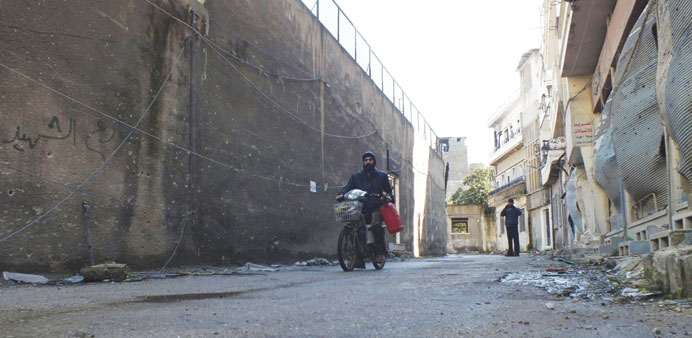An unexploded mortar shell lies on the street in the old city of Homs.
AFP/Raqa
Syrian rebels overran the northern city of Raqqa yesterday, securing their biggest victory since the outbreak of a revolt against President Bashar al-Assad almost two years ago.
In central Syria, the opposition forces battled a major army offensive to capture rebel-held areas of the city of Homs, a watchdog reported.
After days of fierce fighting, the rebels were now in “near-total control” of Raqqa, the Britain-based Syrian Observatory for Human Rights said.
“This is the first provincial capital in Syria where rebels have made such progress,” Observatory director Rami Abdel Rahman told AFP.
“They now have near-total control of Raqqa city, except for some regime positions, including the military security and Baath party headquarters.”
The Observatory said Al-Nusra Front jihadists fought alongside other rebel groups in the battle for the northern city, strategically located on the Euphrates river near the Turkish border.
In Raqqa, residents destroyed a statue of Assad’s father and predecessor Hafez, according to amateur video footage distributed by activists.
“Come here Bashar (al-Assad) and see what happened to your father’s statue!” cried an unidentified cameraman, as he filmed young residents beating the fallen statue with their shoes, while others fired celebratory shots into the air.
The air force then deployed warplanes to bombard an area near the city’s presidential palace, according to the Observatory. The watchdog reported that rebels killed a police chief and captured two senior security officials.
“Rebels took the state security chief to Turkey,” Abdel Rahman said, noting that the road linking Raqqa to Turkey, including the border crossing at Tal al-Abyad, was under rebel control.
Raqqa was once home to 240,000 residents, but some 800,000 people forced to flee violence in other parts of Syria have sought shelter there ever since the start of the conflict, which has claimed more than 70,000 lives, according to the UN.
In the central city of Homs yesterday, insurgents fought a fierce army onslaught a day after at least 264 people were reportedly killed across the country, among them 115 regime soldiers and 104 rebels.
The fighting in Homs “is the worst fighting in months and there are dozens of dead and wounded among the assailants,” said the Observatory, which relies on a network of medics and activists on the ground for its information.
Regular troops backed by pro-regime militiamen attacked the centre of Homs where rebels are holed up, including the Old City and neighbourhoods of Jouret al-Shiah, Khaldiyeh and Qarabees, it said. “On Sunday, the highest number of troops and rebels combined were killed since the start of the conflict,” said the Observatory’s Abdel Rahman.
“We were able to document a death toll of 219 for fighters from both sides for Sunday alone, but we are certain the actual toll is even higher.”
In the northern city of Aleppo, the army tried to take back the historic Umayyad mosque, days after rebels seized it.
Kerry pledges backing for opposition
US Secretary of State John Kerry said in Riyadh yesterday that Washington will work to “empower” Syria’s opposition. Kerry also met over lunch with Palestinian president Mahmoud Abbas, who flew in to Riyadh unannounced late on Sunday.
Kerry stressed that there was no question of arming the Syrian opposition, even as his Saudi counterpart Prince Saud al-Faisal insisted on the right of Syrians to self-defence.
The United States will continue to work with its “friends to empower the Syrian opposition,” Kerry told reporters during a joint press conference with the Saudi foreign minister.
Asked about reports of arms being sent to Syria’s rebels from several countries, Kerry replied: “The moderate opposition has the ability to make sure that the weapons are getting to them and not to the wrong hands.”
However, he added, “there is no guarantee that one weapon or another might not fall in the wrong hands.”
The US has so far refused to arm rebels locked in a two-year war against President Bashar al-Assad’s loyalists.
The GCC members are dissatisfied at the refusal of President Barack Obama’s administration to arm Syrian rebels and its perceived lenient attitude towards Tehran, analysts say.

